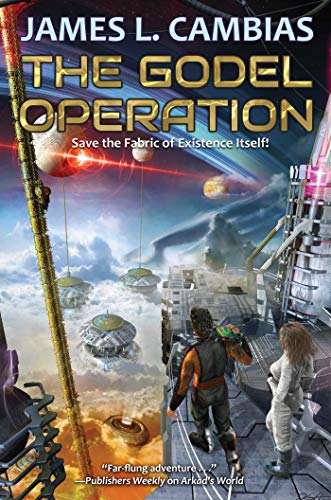
The Godel Operation by James L. Cambias
Trade Paperback: Baen, 978-1-9821-2556-1, $16.00, 273pp, May 2021
(This review will be brief because, while I was intending to get back to blogging this year, I wasn’t intending to review this book when I started reading it. But, in the end, I decided I might as well.)
The Godel Operation is set about eight thousand years in the future in a solar system teeming with life both biological and artificial, which is a sort of miracle since there have been intermittent wars throughout the intervening time, some of which pitted biological vs. artificial life and were vast in scale and ferocious in intensity. Thanks to a change of heart (or new calculation) between the AIs, leading to some civil strife between them, a new, non-genocidal (dis)order arose. So, much like the first decades after WWII, but on a far larger scale of time and space, life in the solar system is doing fairly well after it all, though there are extremists on both sides who still pine for a final solution. Similarly, many habitats have been repaired or created but relics of the wars persist, especially including the Godel Trigger, a legendary weapon that is rumored to be able to eliminate all artificial life.
Our narrator is Daslakh, an AI inhabiting a spider mech body and doing mining chores with Zee, who is “pretty clever for a lump of meat.” When Zee is feeling down, Daslakh contacts the “god” (controlling AI) of Raba, an asteroid of the Uranus Trailing Trojans where the pair lives and works. That AI implants artificial memories in Zee, supposedly to add spice and give meaning to Zee’s life, about a lost love who is actually a character taken from a “first-person virtual entertainment.” This leads to Zee’s determination to find her and make things right, and to Daslakh going with him. So begins a series of adventures taking them to various places in the solar system and closer and closer to the Godel Trigger, culminating on a partially terraformed Mars. Along the way, they meet a woman who has the name of Zee’s “love” and looks like he remembers her but certainly doesn’t act like her, another woman Zee is actually much more drawn to, an uplifted cat and her two human goons, a system-famous thief who may never have stolen anything, and several other more or less colorful humans and AIs.
Daslakh’s sarcastic narrative style, in which light contends with dark, engagement with remoteness, is enjoyable. The other characters are interesting, though the narrative viewpoint allows or covers for some distance. The standard quest plot is deftly executed through a fascinating milieu which makes the solar system feel like a galaxy and gives a good feel of the millennia gone by. Admittedly, Daslakh is a sort of tour guide who tells us about much of this but it’s lightly handled and comes alive with plenty of action, too. In broad strokes, it may not be utterly unique but the details and handling make it seem quite fresh and much more convincing than many other futures. And, as the whole plot plays on one extremely well-known trope, so the ending audaciously reinvents another one. Ultimately, it had something to say about the aesthetic justification of the universe, the changes that can occur to intelligence over time (partly in a social/physical sense, but most pertinently in a personal, psychological sense), and I enjoyed it and recommend it.
